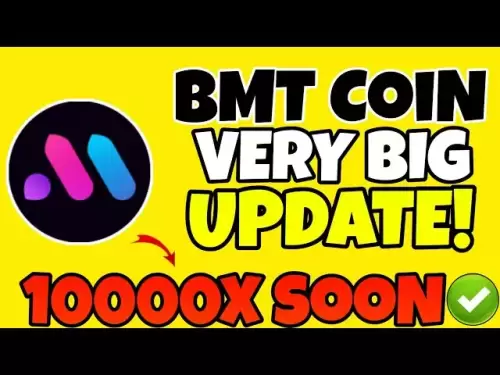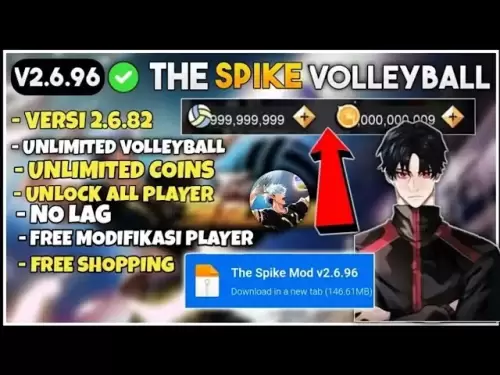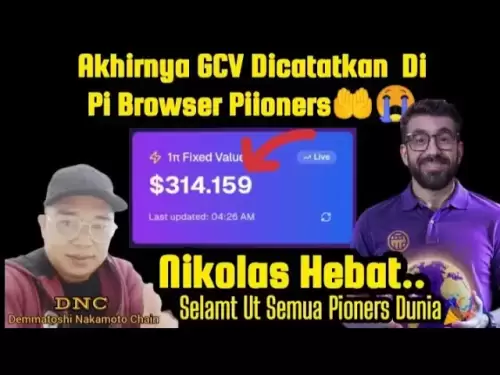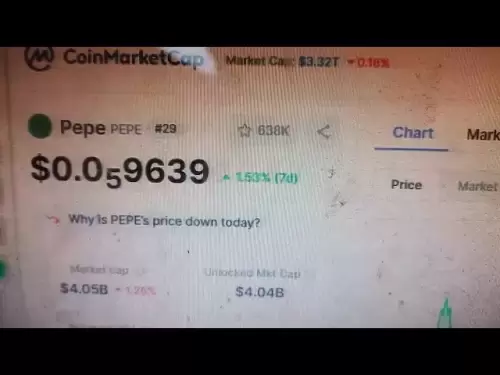-
 Bitcoin
Bitcoin $108,962.3544
0.69% -
 Ethereum
Ethereum $2,563.3189
1.78% -
 Tether USDt
Tether USDt $1.0003
0.00% -
 XRP
XRP $2.2768
2.22% -
 BNB
BNB $661.4562
0.97% -
 Solana
Solana $151.7146
2.47% -
 USDC
USDC $1.0000
0.00% -
 TRON
TRON $0.2847
0.18% -
 Dogecoin
Dogecoin $0.1713
4.43% -
 Cardano
Cardano $0.5848
1.78% -
 Hyperliquid
Hyperliquid $39.5345
-0.06% -
 Sui
Sui $2.9384
1.25% -
 Bitcoin Cash
Bitcoin Cash $492.0864
1.54% -
 Chainlink
Chainlink $13.4271
1.89% -
 UNUS SED LEO
UNUS SED LEO $9.0294
0.07% -
 Avalanche
Avalanche $18.1886
1.61% -
 Stellar
Stellar $0.2430
2.48% -
 Toncoin
Toncoin $2.9054
6.05% -
 Shiba Inu
Shiba Inu $0.0...01186
3.57% -
 Litecoin
Litecoin $88.0187
1.46% -
 Hedera
Hedera $0.1574
1.38% -
 Monero
Monero $315.1335
0.11% -
 Polkadot
Polkadot $3.3994
1.47% -
 Dai
Dai $1.0000
0.00% -
 Ethena USDe
Ethena USDe $1.0002
0.01% -
 Bitget Token
Bitget Token $4.4220
0.86% -
 Uniswap
Uniswap $7.4330
7.03% -
 Pepe
Pepe $0.0...01010
4.10% -
 Aave
Aave $277.8377
2.41% -
 Pi
Pi $0.4572
-0.22%
What is the utility of an nft?
NFTs revolutionize digital ownership by enabling unique, verifiable assets across art, gaming, music, and documentation, empowering creators and users with direct control and value.
Jul 06, 2025 at 11:08 am
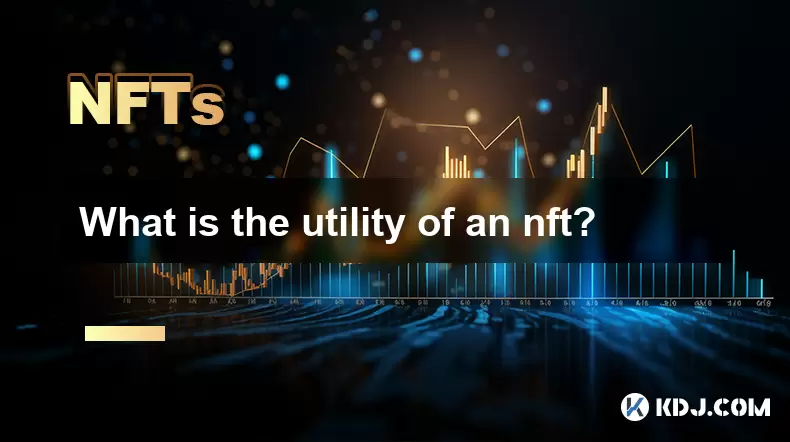
Understanding the Concept of NFTs
An NFT (Non-Fungible Token) is a unique digital asset that represents ownership or proof of authenticity of a specific item or piece of content. Unlike cryptocurrencies such as Bitcoin or Ethereum, which are fungible and can be exchanged on a one-to-one basis, each NFT has distinct properties that make it non-interchangeable with another token. This uniqueness is encoded using blockchain technology, typically on platforms like Ethereum.
The primary characteristic of an NFT is its verifiable scarcity and ownership, which allows creators and collectors to assign value to digital assets in a way that was previously not possible. The blockchain ensures that every NFT transaction is recorded transparently and cannot be altered, providing a secure and immutable ledger for ownership tracking.
Digital Art and Collectibles
One of the most prominent utilities of NFTs lies in the realm of digital art and collectibles. Artists and creators can tokenize their work into NFTs, enabling them to sell directly to a global audience without intermediaries. This process also allows artists to embed smart contracts that provide royalties each time the NFT is resold, ensuring they benefit from future appreciation.
Collectors are drawn to NFTs because they offer a new form of digital ownership. Platforms like OpenSea, Rarible, and Foundation have become marketplaces where users can buy, sell, and trade these digital collectibles. Owning an NFT often grants the holder bragging rights or access to exclusive communities and events related to the artwork or collection.
Gaming and Virtual Worlds
In the gaming industry, NFTs have introduced a paradigm shift by allowing players to own in-game items such as weapons, skins, or characters as verifiable digital assets. These items can be traded across platforms or sold on secondary markets, giving players real-world value for their virtual possessions.
Virtual worlds like Decentraland and The Sandbox utilize NFTs to represent land parcels and other assets within their ecosystems. Users can develop, monetize, and interact with these virtual properties, creating a decentralized economy where ownership and control lie with the users rather than centralized entities.
This utility extends beyond simple aesthetics; it introduces economic opportunities where users can earn income through creation, trading, and participation in virtual economies.
Music and Entertainment
Musicians and entertainers are increasingly leveraging NFTs to distribute their work and engage with fans. By minting songs, albums, or concert tickets as NFTs, artists can bypass traditional distribution channels and retain more control over their intellectual property.
Fans who purchase music NFTs may receive exclusive content, early access to releases, or even shares in royalties. Concert tickets represented as NFTs can prevent fraud and scalping, ensuring that only legitimate ticket holders gain entry.
Additionally, NFTs enable interactive experiences, such as voting on setlists or unlocking behind-the-scenes content, enhancing fan engagement and loyalty.
Identity Verification and Documentation
Beyond creative and entertainment sectors, NFTs are being explored for identity verification and documentation purposes. Educational institutions, for example, can issue diplomas and certificates as NFTs, making them tamper-proof and easily verifiable by employers or other institutions.
Similarly, NFTs can be used for digital identity management, offering individuals secure and portable identification documents that are resistant to forgery. Governments and organizations are investigating how NFT-based IDs could streamline processes like voting, immigration, and healthcare records.
These applications highlight the versatility and security benefits of NFTs in managing sensitive personal data and official documentation.
Frequently Asked Questions
- Can I create my own NFT?
To create your own NFT, you'll need to choose a blockchain platform (like Ethereum), connect a digital wallet, and use an NFT marketplace such as OpenSea or Mintable. Upload your file, set a price, and pay a gas fee to mint the NFT. - Are NFTs environmentally friendly?
Many blockchains that support NFTs, particularly older ones like Ethereum, consume significant amounts of energy due to proof-of-work consensus mechanisms. However, newer blockchains and upgrades like Ethereum's transition to proof-of-stake aim to reduce this environmental impact. - How do I store my NFT securely?
NFTs are stored in digital wallets compatible with the blockchain they were issued on. Popular options include MetaMask, Trust Wallet, and hardware wallets like Ledger. Always ensure private keys are kept secure and never shared with anyone. - What happens if someone copies my NFT?
While the underlying digital file of an NFT can be copied, the blockchain ensures that only one person holds the original token representing ownership. Copying the image or file does not transfer ownership rights, which remain with the NFT holder.
Disclaimer:info@kdj.com
The information provided is not trading advice. kdj.com does not assume any responsibility for any investments made based on the information provided in this article. Cryptocurrencies are highly volatile and it is highly recommended that you invest with caution after thorough research!
If you believe that the content used on this website infringes your copyright, please contact us immediately (info@kdj.com) and we will delete it promptly.
- Litecoin Breakout Watch: What Traders Need to Know Now
- 2025-07-06 16:50:13
- Bitcoin, Solana, Ethereum: Decoding the Latest Buzz on the Blockchain
- 2025-07-06 16:50:13
- Widnes Resident's 50p Could Be Your Ticket to Easy Street: Rare Coin Mania!
- 2025-07-06 16:55:13
- Bitcoin, Solaris Presale, and Token Rewards: What's the Buzz?
- 2025-07-06 16:55:13
- Ethereum Under Pressure: Price Drop Amid Global Uncertainties
- 2025-07-06 17:00:13
- XRP, SEC Case, and Prosperity: A New Era for XRP Holders?
- 2025-07-06 17:10:13
Related knowledge
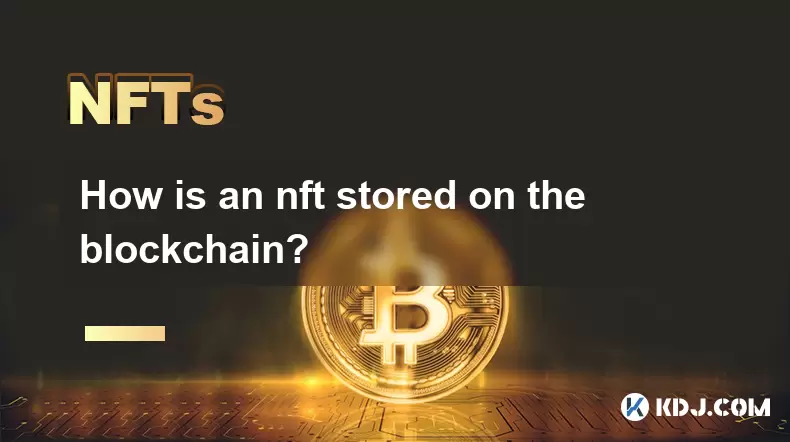
How is an nft stored on the blockchain?
Jul 01,2025 at 04:07am
How Is an NFT Stored on the Blockchain?Non-Fungible Tokens (NFTs) have revolutionized how digital assets are owned, verified, and transferred. Understanding how an NFT is stored on the blockchain provides clarity on its uniqueness, immutability, and traceability. Understanding the Basic Structure of an NFTAn NFT is a unique token that represents ownersh...
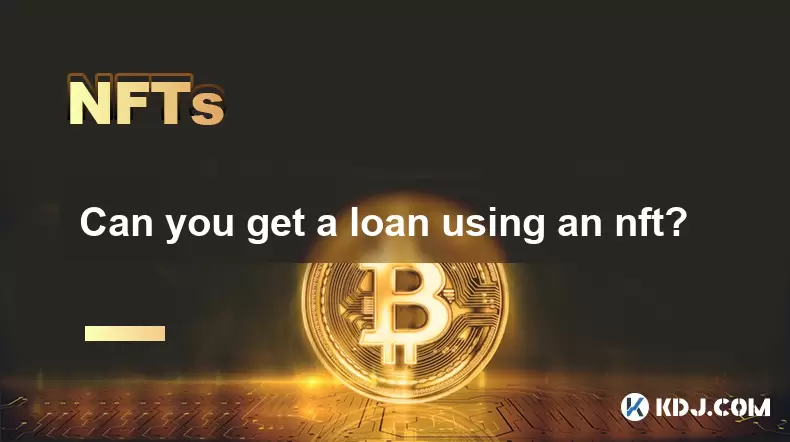
Can you get a loan using an nft?
Jul 05,2025 at 07:32pm
Understanding the Concept of NFT-Based LoansThe idea of using an NFT as collateral for a loan has gained traction in the decentralized finance (DeFi) space. NFTs, or non-fungible tokens, represent unique digital assets on the blockchain. While they are often associated with digital art, collectibles, and virtual real estate, their utility is expanding i...
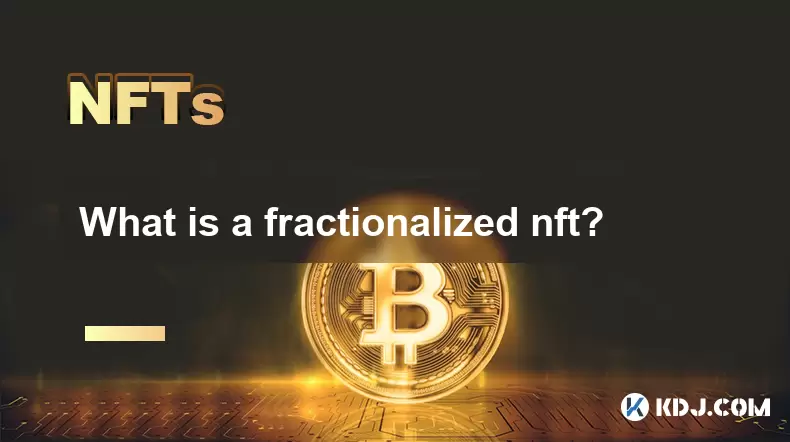
What is a fractionalized nft?
Jul 06,2025 at 10:50am
Understanding the Concept of Fractionalized NFTsA fractionalized NFT refers to a process where a single non-fungible token (NFT) is divided into multiple smaller, tradable parts. These parts represent fractional ownership of the original NFT. This innovation allows high-value NFTs to be accessible to a broader audience by enabling shared ownership. Inst...
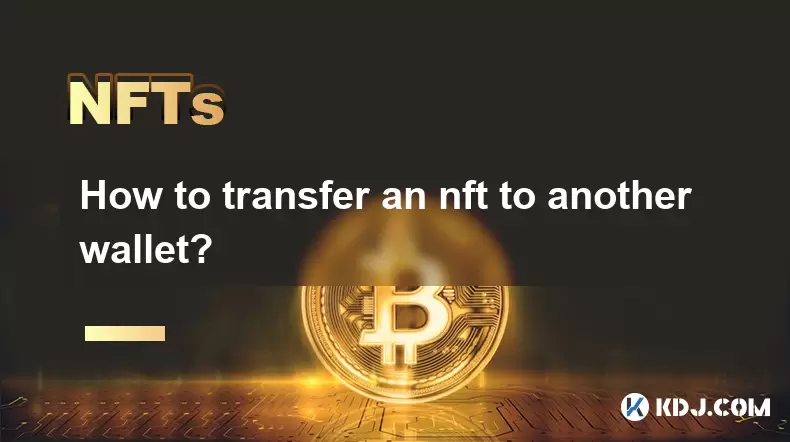
How to transfer an nft to another wallet?
Jul 01,2025 at 10:21am
Understanding the Basics of NFT TransfersTransferring an NFT (Non-Fungible Token) from one wallet to another is a common operation in the blockchain space. Before proceeding, it's crucial to understand what an NFT represents: a unique digital asset stored on a blockchain, typically Ethereum or other compatible chains like Binance Smart Chain or Solana. ...
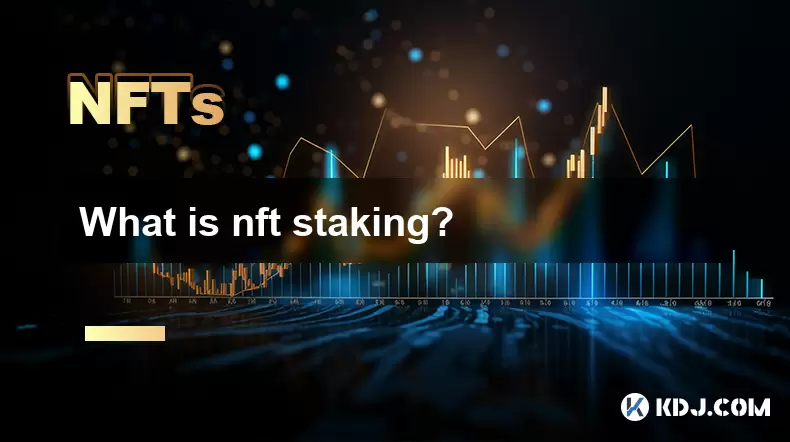
What is nft staking?
Jul 05,2025 at 07:16pm
Understanding the Concept of NFT StakingNFT staking refers to the process where users lock up their non-fungible tokens (NFTs) in a blockchain-based platform or smart contract to earn rewards. This mechanism is similar to traditional cryptocurrency staking, but instead of locking fungible tokens like ETH or SOL, users stake unique digital assets represe...
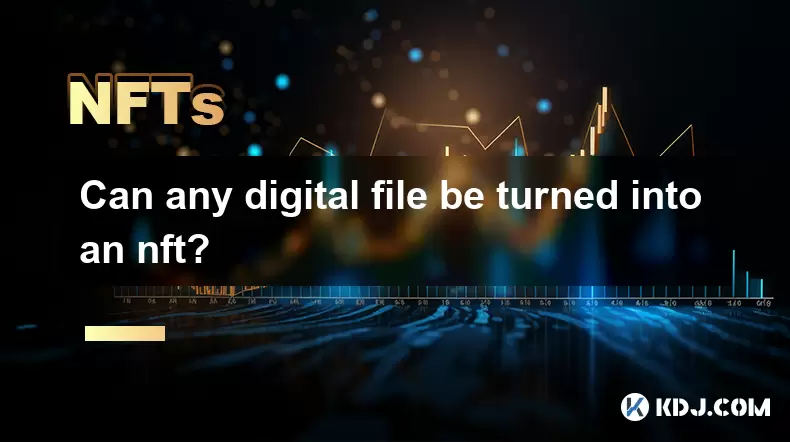
Can any digital file be turned into an nft?
Jul 01,2025 at 07:00am
Understanding the Concept of NFTsAn NFT (Non-Fungible Token) is a unique digital certificate of ownership stored on the blockchain. Unlike cryptocurrencies such as Bitcoin or Ethereum, which are fungible and interchangeable, NFTs represent one-of-a-kind assets that cannot be replicated or replaced. These tokens can represent various types of digital fil...

How is an nft stored on the blockchain?
Jul 01,2025 at 04:07am
How Is an NFT Stored on the Blockchain?Non-Fungible Tokens (NFTs) have revolutionized how digital assets are owned, verified, and transferred. Understanding how an NFT is stored on the blockchain provides clarity on its uniqueness, immutability, and traceability. Understanding the Basic Structure of an NFTAn NFT is a unique token that represents ownersh...

Can you get a loan using an nft?
Jul 05,2025 at 07:32pm
Understanding the Concept of NFT-Based LoansThe idea of using an NFT as collateral for a loan has gained traction in the decentralized finance (DeFi) space. NFTs, or non-fungible tokens, represent unique digital assets on the blockchain. While they are often associated with digital art, collectibles, and virtual real estate, their utility is expanding i...

What is a fractionalized nft?
Jul 06,2025 at 10:50am
Understanding the Concept of Fractionalized NFTsA fractionalized NFT refers to a process where a single non-fungible token (NFT) is divided into multiple smaller, tradable parts. These parts represent fractional ownership of the original NFT. This innovation allows high-value NFTs to be accessible to a broader audience by enabling shared ownership. Inst...

How to transfer an nft to another wallet?
Jul 01,2025 at 10:21am
Understanding the Basics of NFT TransfersTransferring an NFT (Non-Fungible Token) from one wallet to another is a common operation in the blockchain space. Before proceeding, it's crucial to understand what an NFT represents: a unique digital asset stored on a blockchain, typically Ethereum or other compatible chains like Binance Smart Chain or Solana. ...

What is nft staking?
Jul 05,2025 at 07:16pm
Understanding the Concept of NFT StakingNFT staking refers to the process where users lock up their non-fungible tokens (NFTs) in a blockchain-based platform or smart contract to earn rewards. This mechanism is similar to traditional cryptocurrency staking, but instead of locking fungible tokens like ETH or SOL, users stake unique digital assets represe...

Can any digital file be turned into an nft?
Jul 01,2025 at 07:00am
Understanding the Concept of NFTsAn NFT (Non-Fungible Token) is a unique digital certificate of ownership stored on the blockchain. Unlike cryptocurrencies such as Bitcoin or Ethereum, which are fungible and interchangeable, NFTs represent one-of-a-kind assets that cannot be replicated or replaced. These tokens can represent various types of digital fil...
See all articles





















